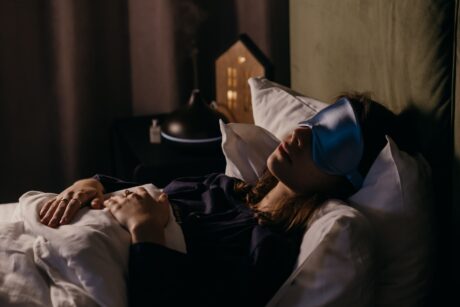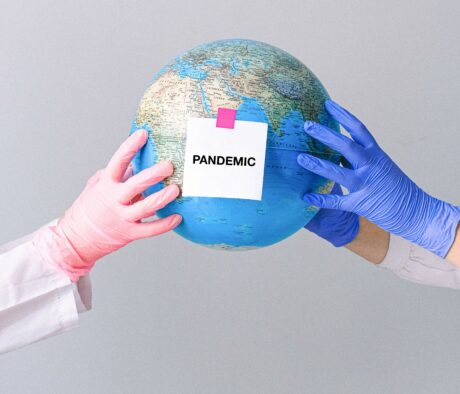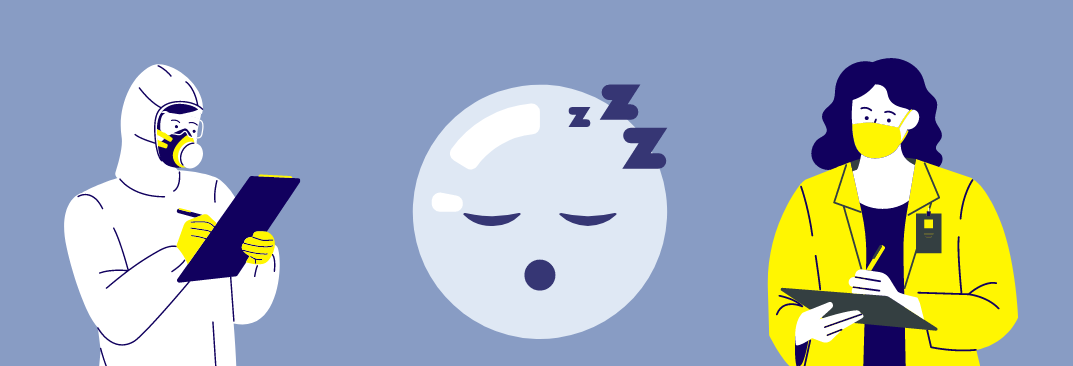Sleep Science Friday: COVID-19 and Sleep Webinar Report
26 March 2021
In celebration of World Sleep Day, 19-March 2021, ESRS hosted a Live Webinar on the topic: Sleep and Sleep Disturbances During the COVID-19 Pandemic – What Can Sleep Research and Sleep Medicine Tell Us? A European Perspective. Almost 300 people from not just Europe, but all over the world participated in the event.
It was chaired by Prof. Dr. Dieter Riemann and featured several renowned panellists, including Prof. Markku Partinen, Prof. Damien Leger, Prof. Nicola Cellini, Prof. Valentina Alfonsi and Prof. Ellemarije Altena. It was an impressive display of the research that our ESRS members have conducted since the start of the COVID-19 pandemic in late 2019/early 2020. Each presenter touched on a unique aspect of how the pandemic has impacted our lives, our work and our sleep in some way or another.
The impact of COVID-19 on sleep and circadian problems: overview and how to study it
Prof. Partinen started off his presentation with an introduction to ICOSS which is an international collaboration to harmonize the data on COVID-19 and sleep to ensure comparability of results. He then went on to note that in studying the effects of COVID-19 on sleep, it is important to distinguish between the biological and psychological effects.
COVID-19‘s impact on sleep and circadian problems stems from the virus impacting the limbic system area, hypothalamus and other centres that are important in sleep/wake regulation, emotion and mental functioning. He noted his concerns that it is likely to experience encephalitis lethargica after being infected – drawing a parallel to what happened after the 1918 Spanish flu. With even further possibility of increased incidence of Parkinson’s disease.
He noted that COVID-19 will be around for a while, so he called for more long-term clinical controlled follow–up studies, immunogenetic studies, intervention studies and studies on using the web in the treatment of various sleep disorders.
COVID-19 pandemic and sleep complaints and hypnotic intake in France
Afterwards, Prof. Leger’s presentation on the pandemic and sleep complaints and hypnotic intake looked on the (French) population’s reactions to the lockdown, with some very surprising results. It was found that sleep problems had increased since previous studies in 2017 (as many would expect). But what was notable was that there were significantly more complaints from women, people under 35 years of age and disadvantaged people. There was also a marked increase in the use of sleeping medication, especially in women, compared to pre-pandemic studies.
There was a high incidence of the respondents with COVID-19 positive PCR, using sleeping medication (60%) and reporting sleeping problems (89%) compared to COVID-19 negative PCR. This is in line with experiencing respiratory problems once infected with COVID-19.
He highlighted the main factors associated with sleep problems: gender, unemployment before the lockdown, financial difficulties due to the lockdown and sleeping pill usage before the lockdown.
Covid-19 lockdown in Italy: impact on sleep patterns, sense of time and digital media use
In assessing the Italians lockdown impact on sleep patterns, sense of time and digital media use, Prof. Cellini’s findings confirm what many of us might have also realized in our daily lives. The lockdown resulted in a sudden shift in our physical activity, exposure to sunlight, daily routines, level of in-person interaction, stress, fear, anxiety and depression surrounding the pandemic, which ultimately affected our sleep behaviour in one way or another.
His study found that in workers and students in Italy, sleep in general, has been delayed by 40 mins and wake-time delayed by an hour, and even longer for workers. The pandemic has also led to workers spending significantly more time in bed than students.
Overall, there was a high level of moderate to severe depression, anxiety and stress as a result of the pandemic, which contributed to both groups spending longer to try and fall asleep only to experience reduced sleep quality. Both groups also had a significant increase in their use of digital media 2 hours before going to sleep which only had a moderate association with the change in their bedtime and sleep quality.
Additionally, as it relates to time, both groups found it more difficult than usual to track their time and to maintain a schedule/routine, and also felt time was moving slower. This is important to note especially now, as since this study was concluded, we are still experiencing some level of lockdown in our countries and may continue for weeks.
Pandemic nightmares
Following this, Prof. Alfonsi presented an interesting look on the effects of COVID-19 on our dream activity. Her study found that we generally experience more frequent vivid, emotional dreams and nightmares due to in the pandemic due to poor sleep behaviour.
Her study found that there is a higher dream frequency associated with younger people, women, people without children and with a higher sleep duration. And, predictors of a higher nightmare activity were younger age, women, modification of daytime napping and higher intra-sleep wakefulness, sleep duration, sleep problem index, anxiety and depressive symptoms. Additionally, there were higher emotional features of dream activity in workers who have stopped working, people with relatives/friends who were infected or passed away from COVID-19 and those who changed their sleeping habits.
She suggested we should monitor dream changes during the epidemic, and also consider the implications for clinical treatment and prevention of mental and sleep disorders.

How to deal with sleep problems during the Covid-19 pandemic: recommendations from a European taskforce
After hearing all the presentations on the effects of the pandemic on sleep, Prof. Altena’s research on how to deal with insomnia (expanded to sleep problems in general) was a great way to wind down the webinar.
Insomnia has significantly increased during COVID-19 but, employing an adapted CBT-I, she proposed several recommendations for better sleep during confinement: keeping a regular schedule, getting enough access to light, exercising, limiting exposure to the news (especially before bed), rumination and conversations with children during the day, associative reconditioning and social interaction.
The lockdown has been a largely negative experience for the whole world, but not entirely without benefit. It has led to people gaining more respect for their natural wake/sleep rhythm and has led to increased family time, especially young children.
Her call to action especially in Europe was to:
- Treat more insomnia patients
- Make CBT-I more accessible
- Credit existing and new courses to train CBT therapists
If you weren’t able to be with us LIVE, you can catch the replay – available to members on demand.
Upcoming Events
Virtual Sleep and Breathing 2021
Still interested in more research on sleep and COVID-19? Then don`t miss the symposium, Sleep in the New Era of COVID, chaired by A. Simonds and J. Verbraecken. at Sleep and Breathing Virtual this April. This symposium aims to discuss the bidirectional relationship of COVID-19 on patients with Obstructive Sleep Apnea and obesity from pathophysiology to therapeutic implications. Moreover, the session will present the potential effect of pandemics/endemics on sleep quality and Sleep Disorders beyond SBD. Last but not least, to discuss the challenges that Sleep medicine faces as a result of the pandemic/endemics and ways to move forward. More information: Sleep and Breathing 2021 – Virtual – Programme (ersnet.org)
Sleep School 2021
The 3rd ESRS Sleep Science School on the topic “The Functions of Sleep” will be held 26 September to 1 October, 2021, at the CNRS Villa Clythia site in the city of Frejus at the Mediterranean Sea (South France). Our Sleep Science Schools are aimed at gathering early career sleep scientists, allowing them the opportunity to gain knowledge, share their work and experience, meet experienced researchers, develop further opportunities and create novel networks of excellence.
Here’s more information on who can apply and how to apply. There are limited places for participation, so don’t delay!
Want to see what else is coming up? Check out our Events Calendar for even more events!
ESRS Reminders
The Sleep Medicine Committee (SMC) has extended its deadline for its Call for New Effective Members until 30 April 2021.
There are several projects that require effective members – We Need You! To get further information or to apply if you’re already interested, please see more details here.
Recent publications from ESRS members:
- Maciel et al. (2021). Is REM sleep a paradoxical state?: Different neurons are activated in the cingulate cortices and the claustrum during W and paradoxical sleep hypersomnia. Biochem Pharmacol.
- Bruyneel et al. (2021). Prevalence of acromegaly in moderate-to-severe obstructive sleep apnea. Clin Endocrinol (Oxf).
- Sweeney et al. (2021). Impairments in glycaemic control do not increase linearly with repeated nights of sleep restriction in healthy adults: a randomized controlled trial. Appl Physiol Nutr Metab.
- Koritala et al. (2021) Night shift schedule causes circadian dysregulation of DNA repair genes and elevated DNA damage in humans. J Pineal Res.
- Liu et al. (2021) Night shift schedule alters endogenous regulation of circulating cytokines. Neurobiol. Sleep Circadian Rhythms
- Viste et al. (2021). High nocturnal sleep fragmentation is associated with low T lymphocyte P2Y11 protein levels in narcolepsy type 1. Sleep.
- Sringean et al. (2021). REM Sleep Behavior Disorder and REM Sleep Without Atonia are More Frequent in Advanced versus Early Parkinson’s Disease. Sleep.
- Nissen et al. (2021). Sleep is more than rest for plasticity in the human cortex. Sleep.
- Pavsic et al. (2021). Mixed Apnea Metrics in Obstructive Sleep Apnea Predict Treatment-Emergent Central Sleep Apnea. Am J Respir Crit Care Med.
- Silvani et al. (2021). Combining information on nocturnal rapid eye movement sleep latency and atonia to facilitate diagnosis of pediatric narcolepsy type 1. Sleep.
Just published an article? Want your research to be featured? Saw something interesting? Contact us at ESRS



